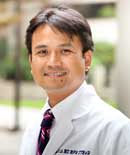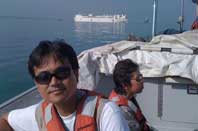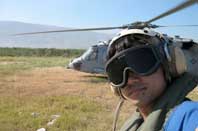Interview with Phuoc Le
A Conversation with Phuoc Le, Associate Clinical Professor
Today is UN Humanitarian Day as well as National Men's Grooming Day. What might you do to celebrate either one?
 My wife would say that I should probably clip my nose hairs but then she’s never bought me a clipper, so there you are. It’s sad that only one day is set aside for UN Humanitarian Day; it seems that we should be thinking about humanitarian crises and disasters every day. I’m not doing anything particularly different today but, as people who work in a humanitarian field, we are in essence thinking about and acting on it every day.
My wife would say that I should probably clip my nose hairs but then she’s never bought me a clipper, so there you are. It’s sad that only one day is set aside for UN Humanitarian Day; it seems that we should be thinking about humanitarian crises and disasters every day. I’m not doing anything particularly different today but, as people who work in a humanitarian field, we are in essence thinking about and acting on it every day.
Is it correct that your name, Phuoc, means "blessing" or "lucky?" Are you?
I am blessed and lucky to have the experiences I’ve had. In both Vietnamese and Chinese, my name means “blessing” or “good fortune.” Unfortunately, growing up, it wasn’t such a blessed name as I learned starting in the second or third grade and it got worse right up through high school. In Haiti, while diligently looking up words for various body parts, I learned that my name phonetically in Creole means … well, it probably isn’t fit for publication. After that, I just introduced myself by my last name.
You immigrated to the US at a very young age, I believe. How old were you and what do you remember about that time?
I was among the refugees, known as the boat people, escaping Communism in the late 70s, early 80s, after the Viet Nam war. I remember being about four or five, clinging onto my mother’s back as she moved from one part of the boat we were on to another; a huge wave hit and we fell into the South China Sea. My uncle dove in and pulled us out otherwise it would have been certain death. After that, we were in a Chinese refugee camp, in Hong Kong, for about a year and my mom worked in a factory sewing Jordache jeans.
Where were you born in Viet Nam and when was the last time you were there?
I was born in Quang Tri province, near the 17th parallel, the provisional military demarcation line between North and South Viet Nam during the war. Much of my family still lives nearby in Hue. I was there about a year ago visiting my grandmother who is over ninety years old, takes no medications, and has 20-something grandchildren. One time she called me, saying, “I’m dying, I’m dying.” I rushed down and found her walking quite well, much faster than me in the blazing heat!
Your CV reveals an amazing pursuit of knowledge of the world in languages, cultural practices, and philosophy. Please tell me about Chinese newspaper reading.
Chinese newspaper reading is an exercise in human torture. You have to learn at least 3,000 characters before you can even, at a fourth grade level, attempt to read and then you have to look up at least a third of them. That’s excruciating because it is not a phonetic language and there are about 50,000 characters. The way that a newspaper is written is very propagandized and the vocabulary is formulaic, and no doubt the government approved every single word.
What do you do for fun?
Traveling with my wife. We like to be someplace new, preferably with friends, like not long ago when we spent two weeks in Greece and Turkey. We relaxed, enjoyed nature, the water, the beauty, oh, and the food! I also really enjoy spending time with my family in Sacramento.
I was touched by the film clip from the Harvard Gazette of your work in Haiti in 2010 when you led medical volunteer coordination activities. What is it about such involvement that makes it all worthwhile?
I would have to ask myself what was not worthwhile despite how arduous it looked. It was a privilege and honor to work and stand in solidarity with the people of Haiti and the other volunteers who were there. In terms of the day-to-day work, even to be able to provide temporary relief of the suffering, whatever form that took, was humbling.



Of the indigenous people with whom you've worked, is there a group whose beliefs you have integrated into your own?
I spent quite a bit of time in Tibet, in Lhasa, and, while I grew up in a Buddhist family, learned a different practice of Buddhism in Tibet. What struck me was the sense of internal peace that people gain while persevering towards a goal; some take long journeys to the temples during which they continuously prostrate themselves and eat only food that is given to them. That brought me humility and I long for that inner peace that they have; it’s a palpable sense of deep spirituality.
Are you handy with tools? What was your most successful repair or disastrous uh-oh?
Here’s how handy I am: Once, after September 11, I packed my toolkit in my carryon with a hammer, screwdriver, etc. It was confiscated and we didn’t have a toolkit of our own for years afterwards. Then again, after my wife and I were married, I packed a beautiful engraved wedding gift, an 18” cake knife, onto my carryon but this time, after I begged and pleaded, it was checked but not confiscated.
Could you share any examples of concepts common to other languages that are not easily translatable to English?
When I started learning Haitian Creole, I noticed that people responded to greetings with interesting replies. A "Kijan ou ye—how are you?" might be answered by "Nap boule” (We're burning) or "Nap kenbe” (We're hanging on) or "Nap frappe” (We're fighting). Not until you spend some time in Haiti, listen to the people and read about struggles that have been continuous since the time of slavery, can you truly appreciate the appropriateness of those greetings.
How did you meet your wife and what about her made you realize that she was the one?
We met in college when I was her Chinese language teaching assistant in Beijing. My wife is as real as real can get; she has not a strand of fakeness within her. She is extremely earnest and we share similar ideals and beliefs. She is a social justice lawyer and we feel that we essentially do the same thing: provide for the same basic fundamental human rights that everyone should have. We make a good team and make each other laugh.
In Spanish, Vaya con Dios is a parting wish that conveys a wish or, if you will, a blessing. Would you leave me with one of your own favorite parting phrases?
In Chinese, in Mandarin, the phrase “Man zou” is said when people leave your home or a restaurant and literally means “walk slowly.” I guess it’s the equivalent of “drive safely.”
Then man zou, Phuoc, and thank you.
- by Oralia Schatzman
View Phuoc's professional bio | See previous faculty interviews
